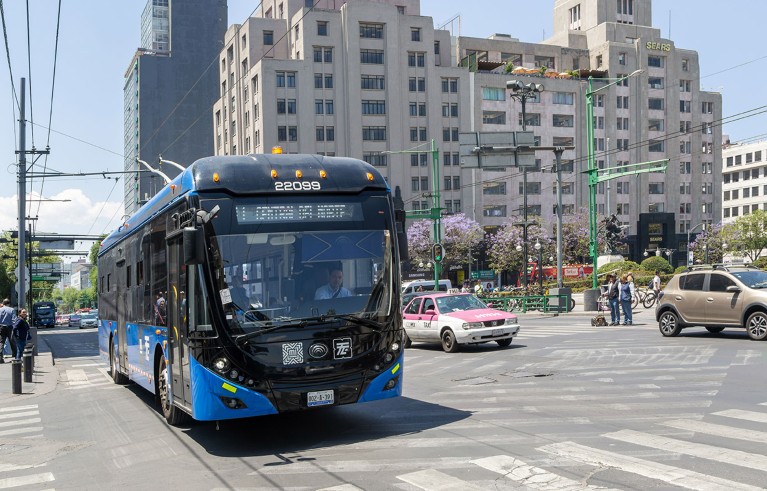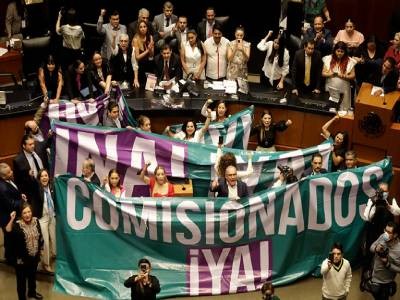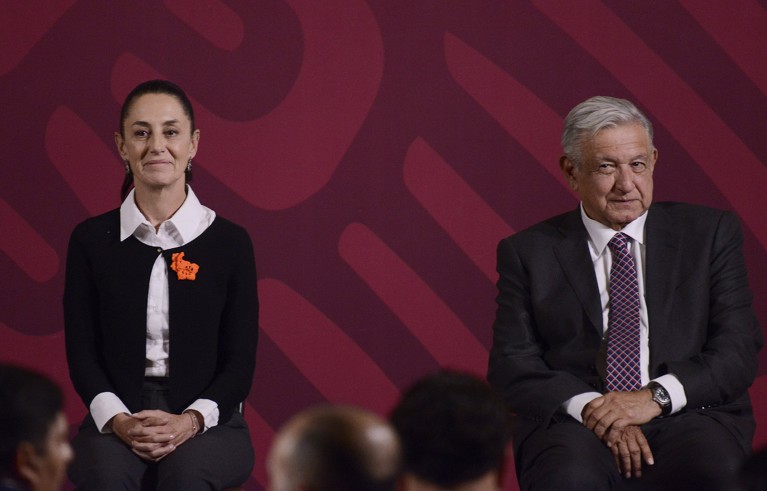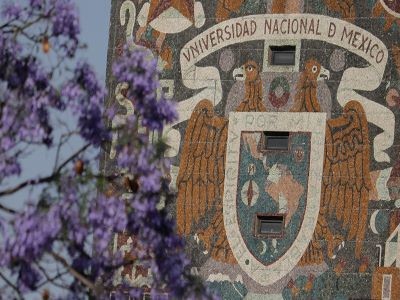Environmental engineer Claudia Sheinbaum Pardo will probably make history next week — by becoming Mexico’s first female president. National polls ahead of the 2 June election currently show her garnering an average of 50% of the vote, ahead of the other two candidates. If she wins, she will join a relatively small group of scientists who went on to lead their countries.
But just because Sheinbaum Pardo has a scientific background doesn’t mean that all researchers in Mexico are rooting for her. Some worry that she will follow too closely in the footsteps of her predecessor, leftist Andrés Manuel López Obrador, whose six-year presidential term will soon end. López Obrador has drawn fire for pushing forward an unpopular law criticized for consolidating government power over science and instituting debilitating research–budget cuts, among other decisions.
Others hope that Sheinbaum Pardo’s inner scientist will guide her. For instance, Silvia Torres-Peimbert, the first woman in the country to receive a PhD in astronomy and a researcher at the National Autonomous University of Mexico (UNAM) in Mexico City, is convinced that Sheinbaum “is going to try to improve the situation”, and that she “aims for Mexico to become a scientific, technological and innovation power”.
From science to politics
The daughter of a biochemist and a chemical engineer, Sheinbaum Pardo pursued a similar path, earning her undergraduate degree in physics and a PhD in environmental engineering at UNAM. From 1991 to 1994, she completed some of her doctoral work at the Lawrence Berkeley National Laboratory in California, where she studied energy consumption in Mexico and other industrialized nations.
Thousands protest Mexico’s new science law
Sheinbaum Pardo’s immersion in politics began during her time at UNAM, when she was part of a student group protesting the university’s plan to begin charging tuition. Several students in that movement, along with some academics and politicians, formed a leftist political party that would in 2000 catapult López Obrador into the position of mayor of Mexico City. Once in office, he appointed Sheinbaum Pardo as his environment secretary.
The two remained close during both of his unsuccessful presidential runs in 2006 and 2012. At the same time, she returned to her academic work: among other achievements, she co-authored a chapter in a 2007 report by the United Nations Intergovernmental Panel on Climate Change, which won a Nobel Peace Prize. In 2018, López Obrador, who had earlier founded the leftist National Regeneration Movement (Morena) party, finally became president — and Sheinbaum Pardo became the first female mayor of Mexico City.
Supporters maintain that, despite her close relationship with the current president, Sheinbaum Pardo will make her own decisions. “Claudia is going to support science, and she is going to rely on science,” says Rosaura Ruíz Gutiérrez, a biologist at UNAM who is an adviser on Sheinbaum Pardo’s campaign team.

While she was the mayor of Mexico City, Sheinbaum Pardo established the first transit system of electrified buses.Credit: Geography Photos/Universal Images Group via Getty
They point to her time spent governing Mexico City, when she made significant advancements in science by initiating the construction of the world’s largest urban photovoltaic plant, which cost 661 million pesos (US$39 million) to build and has a goal of reducing carbon dioxide emissions by 11,400 tonnes annually. Sheinbaum Pardo’s administration also established the first rapid-transit network of buses in the city — and in Latin America — that run on electricity.
A break from the status quo?
But the environmental engineer has also faced scientific controversy. In 2020, her administration in Mexico City began building a bridge for automobiles that affected the Xochimilco wetlands, which are a World Heritage Site, designated by the United Nations cultural organization UNESCO, and are protected under Mexican law. People living near the wetlands and environmentalists criticized the government for the lack of transparency regarding the project.
In 2021, Sheinbaum Pardo’s administration announced an investment of more than 980 million pesos in the restoration and conservation of Mexico City’s wetlands. But critics such as Alejandro Palmerín, a former urban-transportation engineer for Mexico City and environmental activist, point out that her government had fast-tracked the bridge’s construction ahead of an environmental impact report being submitted. This is a similar strategy to one that López Obrador used to start construction of the controversial Mayan Train, a more than 1,500-kilometre railway that, when finished, will cut through biodiverse jungle and archaeological sites on the Yucatán Peninsula to connect tourist destinations.
Palmerín says that if Sheinbaum Pardo comes to power, it would be “laudable for her to break with the legacy the president has left”.
A community divided
Both supporters of Sheinbaum Pardo’s rise to power and those who oppose it say that she will have to make a significant effort to ease the tension that López Obrador’s administration has created with the scientific community.
“The most serious damage done to the [scientific] system was to have politicized it,” says María Brenda Valderrama Blanco, a biomedical researcher at UNAM and a member of the Red ProCienciaMX — a group of scientists, physicians and others in Mexico who have been critical of the current administration.
Sheinbaum Pardo (left) has remained close with her political mentor, Andrés Manuel López Obrador (right), Mexico’s current president.Credit: Carlos Tischler/ Eyepix Group/Future Publishing via Getty
For instance, López Obrador and María Elena Álvarez Buylla, whom he appointed as head of the country’s main science agency, drew a line during his presidency between science supporting the country — aiming to solve problems such as poverty — and “neoliberal science” — serving the interests of industry and other elite groups. The discourse caused a rift in the scientific community that continues today. On 20 May, a group of 250 intellectuals and scientists endorsed Xóchitl Gálvez, another presidential candidate. Four days later, 900 scientists, artists and other intellectuals declared their support for Sheinbaum Pardo.
Edgar Guerra, a sociologist at the University of Aguascalientes in Mexico, disagrees that politics can be removed from science, however. “We cannot think that science is innocent and free of interests,” he says. In this sense, it is “legitimate” for a new political force to redirect projects and resources, he adds. Problems arise, however, when the opinions of those in the scientific community are not seriously considered.
Attempt to charge Mexican scientists with ‘organized crime’ prompts international outcry
Last year, the López Obrador administration made one of its most controversial decisions: fast-tracking approval of a law that, according to critics, undermines the autonomy of scientific research in Mexico and prioritizes funding for projects aligned with government interests, rather than basic science. Another major controversy occurred in 2021, when the Mexican government accused 31 scientists and officials with organized crime and money laundering. Last month, a judge closed the case owing to a lack of evidence to support the accusations.
Whether Sheinbaum Pardo will uphold her predecessor’s austerity measures and continue using his rhetoric remains to be seen. But Ruíz Gutiérrez suggests that Sheinbaum Pardo will “continue with much that has been done well and also correct what has to be corrected”.
Among the campaign promises that Sheinbaum Pardo has made regarding science are to extend her work electrifying buses in Mexico City to the whole country, and supporting the renewable energy transition by constructing, for instance, photovoltaic, wind and green hydrogen plants.
At a 30 April campaign meeting with academics and scientists across Mexico, Sheinbaum Pardo told the almost 200 attendees that her “commitment is always to the development of education, science, innovation and humanities, and a prosperous Mexico with justice”.






More News
The Amazon’s gargantuan gardeners: manatees
Publisher Correction: Single-crystalline metal-oxide dielectrics for top-gate 2D transistors – Nature
The baseless stat that could be harming Indigenous conservation efforts